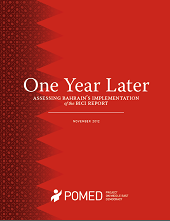For a full text copy of the report, click here.
On November 23, 2011, the Bahrain Independent Commission of Inquiry (BICI) issued a 500-page report summarizing its findings regarding the February-March 2011 popular uprising and the government’s heavy-handed response. The BICI report described in detail frequent use of excessive force by security forces, systemic abuse and torture of detainees, mass discrimination and dismissals of workers and students, and grave violations of medical neutrality. The report highlighted a culture of impunity prevalent among government officials at all levels, concluding that many abuses “could not have happened without the knowledge of higher echelons of the command structure.”
The BICI report was welcomed by the international community as a potentially critical step toward resolving the country’s escalating political crisis. One of the most common criticisms of the report was that while the documentation of the events of February and March 2011 was extremely thorough, the report’s mandate and its 26 recommendations to the Government of Bahrain did not extend far enough to resolve the country’s political crisis. Nonetheless, observers in Bahrain and the international community were hopeful these recommendations – if implemented swiftly, sincerely, and thoroughly – could set the stage for genuine national reconciliation and a process of meaningful political reform.
One year later, as tensions in Bahrain continue to escalate, any understanding of the current crisis must include an honest, accurate assessment of the progress in implementation of the BICI recommendations. In this report, we have strived to carefully carry out such an assessment, although the task was made considerably more difficult by the lack of transparent, relevant information from Bahraini government officials, as well as the very limited access provided to independent organizations, researchers, and journalists. If the government is making substantially more progress
on implementing the BICI recommendations than it appears based on publicly available information, then they must more transparently provide evidence to support such claims and allow access for outside observers to confirm such claims independently. We have found that the Government of Bahrain has fully implemented three of the BICI report’s 26 recommendations. Two other recommendations were impossible for us to properly evaluate due to a lack of available information, and 15 recommendations have only been partially implemented. Finally, the government has made no meaningful progress toward six of the recommendations, which are precisely the most important steps that need to be taken – accountability for officials responsible for torture and severe human rights violations, the release of political prisoners, prevention of sectarian incitement, and the relaxation of censorship and controls on free expression.
Nearly as troubling as the failure to address key areas has been the unrealistic assessment by the Government of Bahrain of its own progress. Bahraini government officials, including the Ambassador to the United States, have claimed in public statements to have fully implemented 18 of the 26 recommendations. It is difficult to expect the government to make significant progress on the many unfulfilled recommendations while it maintains that most of those steps have already been completed.
The Government of Bahrain has announced that it will soon issue its own report regarding the implementation of the BICI recommendations. We welcome this announcement and hope that the government will seize this opportunity to offer a more frank assessment of its own progress, to adopt greater transparency about its accountability mechanisms, and to recommit to the swift implementation of the numerous steps yet to be taken.
If this proves not to be the case, then we urge international actors, particularly the U.S. government, to pressure Bahrain to move quickly in this direction. As noted above, even the full implementation of the BICI recommendations would fall well short of resolving the current political impasse in Bahrain. But such moves are essential to national reconciliation and genuine political reform. Meaningful reform that fully addresses the legitimate democratic aspirations of the Bahraini people remains the only path to lift the country out of its current crisis. As such, it is also the only approach that will stabilize the country and secure Bahrain as an ally of the United States in the long-term.
Photo credit: Sara Hassan, Al Jazeera





